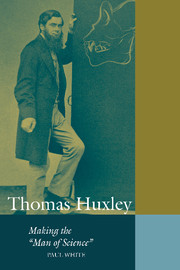Book contents
- Frontmatter
- Contents
- Illustrations
- Acknowledgments
- Introduction
- 1 Science at Home
- 2 Gentlemen of Science? Debates over Manners and Institutions
- 3 Science as Culture
- 4 The Worship of Science
- 5 “Darkest England”: Science and Labor in the 1880s and 1890s
- Conclusion: The End of the “Man of Science”
- Bibliography
- Index
2 - Gentlemen of Science? Debates over Manners and Institutions
Published online by Cambridge University Press: 25 June 2009
- Frontmatter
- Contents
- Illustrations
- Acknowledgments
- Introduction
- 1 Science at Home
- 2 Gentlemen of Science? Debates over Manners and Institutions
- 3 Science as Culture
- 4 The Worship of Science
- 5 “Darkest England”: Science and Labor in the 1880s and 1890s
- Conclusion: The End of the “Man of Science”
- Bibliography
- Index
Summary
I have just received H's coarse-looking little book [Man's Place in Nature] – not fit as somebody said to me, for a gentlemans table.
– Joseph Hooker to Charles Darwin, 1863As Huxley sought a scientific career, first at sea and then in London, during the late 1840s and early 1850s, he drew on a range of models of manliness from the imperial culture of exploration and conquest and from the heroes of sentimental fiction. He also appropriated ideals of Victorian womanhood and domesticity to distance himself from and obtain moral authority over other forms of commercial and industrial endeavor. Isolated for much of this period from the metropolitan world of learning, he conferred a social meaning upon his scientific work through the novels he read, the journal he kept, and the extensive correspondence he undertook with his fiancée. How then did Huxley conduct himself with other gentleman practitioners whose company he now wished to join? How did he position himself within this diverse scientific community? Who became his models, mentors, and patrons?
At mid-century, the sciences in Britain had little of the career structure and few of the defining institutions of today, such as the large research laboratory with its team of experts, the academic department, or the university degree.
- Type
- Chapter
- Information
- Thomas HuxleyMaking the 'Man of Science', pp. 32 - 66Publisher: Cambridge University PressPrint publication year: 2002



